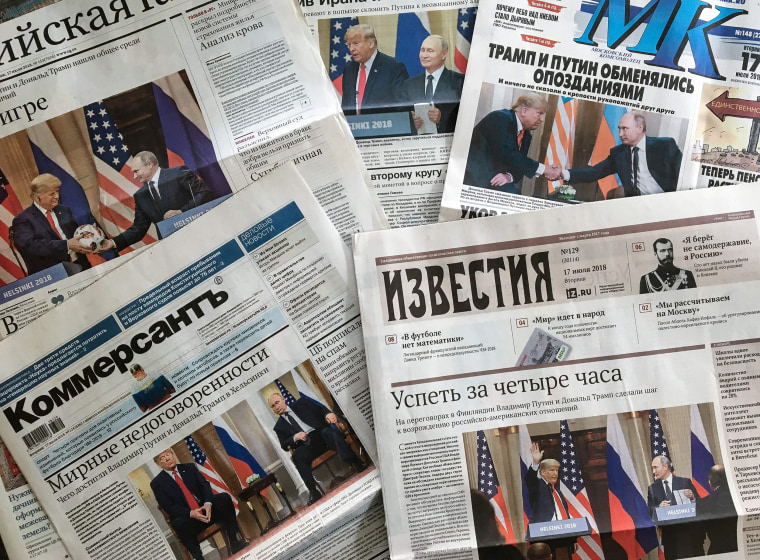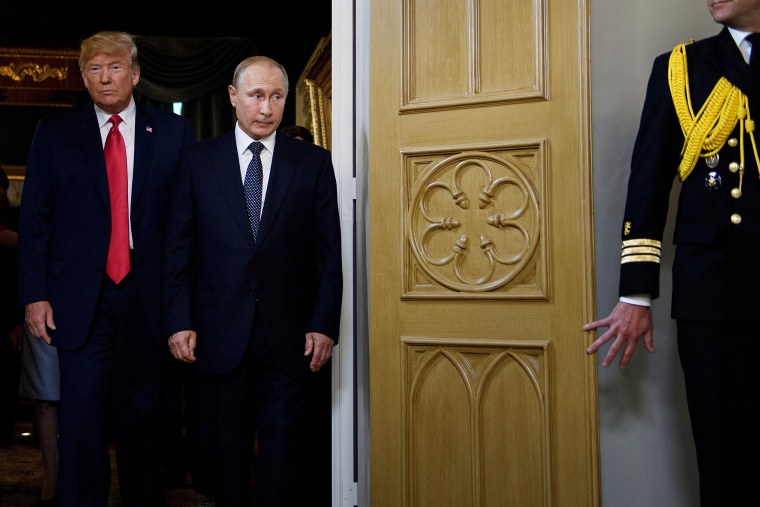LONDON — President Donald Trump's comments in a news conference with Russian President Vladimir Putin in Helsinki on Monday prompted widespread shock and derision across the United States, but his extraordinary appearance — widely deemed to have undermined American institutions while empowering a rival — also reverberated outside the U.S.
The brunt of the criticism centered on Trump's decision to side with Putin against American intelligence agencies over whether Moscow meddled in his 2016 election to the White House.
A sampling of reaction around the world:
Germany
Wolfgang Ischinger, Germany's former ambassador to the U.S., summed up the view from his country by retweeting ex-CIA Director John Brennan — who said Trump's remarks were "nothing short of treasonous" — and added that "Europeans are really scared."
The tabloid Bild on Tuesday carried the headline: "Reactions to Trump-Putin meeting: Too weak, too submissive — a disgrace!"
The Munich-based newspaper Sueddeutsche Zeitung wrote that "for Europe, this spells trouble," while a comment piece in Spiegel magazine said Trump offered "bromance rather than clear words" for Putin.
Trump's meetings with Putin capped a whirlwind six days in which he caused chaos at the NATO summit in Brussels by threatening allies over defense spending and singling out Germany about a pipeline deal with Russia.
"We can no longer completely rely on the White House," Germany Foreign Minister Heiko Maas told the Funke newspaper group Monday. "To maintain our partnership with the U.S.A. we must readjust it. The first clear consequence can only be that we need to align ourselves even more closely in Europe."
Russia
While Trump was criticized at home, Putin unsurprisingly returned to almost unanimous praise.
Most Western analysts agreed that the Russian leader had achieved his goals merely by securing the one-on-one meeting, a step toward normalizing relations after Moscow's interventions in Ukraine, the U.S. presidential election and other transgressions.
The Russian economy has been struggling after it was hit with international sanctions for its 2014 annexation of Crimea, its support for separatists fighting the government in eastern Ukraine and alleged meddling in the 2016 U.S. presidential election.
Before Trump and Putin even sat down, the Russian foreign ministry raised eyebrows by "liking" a Trump tweet critical about the U.S. investigation into election meddling.
Russian headlines afterward were triumphant.
"The West's attempts to isolate Russia failed," read the state-run newspaper Rossiisskaya Gazeta, according to a translation by Reuters.
In Moscow, there was a recognition that the summit did not produce any breakthroughs on issues such as Syria, Ukraine or arms control. Instead, the focus was on the symbolism of the leader of the world's remaining superpower sitting one-on-one with Putin after years of international isolation.

"The attention of the whole world is focused today on Helsinki and it's crystal clear to everyone: The fate of the world is being decided between Russia and the United States, the leaders of the two major powers of our planet are meeting," Alexey Pushkov, a member of the upper house of the Russian parliament, tweeted Monday.
Putin faces little genuine political opposition and controls much of the press in his country.
United Kingdom and France
Sandwiched between the NATO meeting and the summit in Helsinki, Trump caused mayhem during a four-day visit to Britain.
He used a surprise interview with The Sun newspaper to trash Prime Minister Theresa May's Brexit plans and suggest she had killed the possibility of reaching a trade deal with the U.S.
He also sparked widespread protests across the country, including some of the largest demonstrations London has seen in years.
While Helsinki played out, British lawmakers have been busy dealing with their own Brexit-related politics this week. But the verdict of the U.K. press following the Trump-Putin meeting has been largely scathing.
"Putin's Poodle," read the headline in the Mirror tabloid, while broadsheets The Times and The Guardian focused on the backlash in the U.S.
In France, giddy after its World Cup final win on Sunday, leading newspaper Le Monde still found space on its homepage to report: "Vladimir Putin dominates the Helsinki match against Donald Trump."
The Baltics and Ukraine
Historically, the Western allies most nervous about the prospect of Russian aggression and meddling have been the Baltic states.
Still, reaction in Estonia, the most northerly of the three states, was more moderate than in other parts of Europe.
"The headlines of the three biggest Estonian dailies all agree that the meeting … whilst being a resounding victory for Putin, did not yield anything particularly unexpected or unpleasant," read a roundup by the website ERR News.
Eesti Päevaleht, an Estonian newspaper, wrote that ''this time we got lucky in Helsinki." Like others it appeared relieved that, symbolism aside, no specific policies were agreed upon.
Another hotbed of Russian-related tension is Ukraine, which lost Crimea to annexation by Moscow and a large chunk of its east to a conflict with Kremlin-backed rebels.
Trump made no mention of Crimea nor the war in Ukraine during the news conference with Putin. And he has reportedly suggested that Crimea should be handed to the Russians because people there speak its language.
Following the summit in Helsinki, Ukrainian President Petro Poroshenko tweeted, "We are ready to defend our land even if we must do it alone, without international support."
China
On the surface, the government in Beijing appeared largely unfazed by the summit.
"We paid close attention to the Russian-U.S. leaders' meeting in Helsinki yesterday," foreign ministry spokeswoman Hua Chunying told reporters Tuesday. "We hope that Russia and the United States will strengthen communication and expand cooperation."
Hua said this hope was altruistic in that it would have "no effect" on U.S.-China relations but rather it would "benefit the world's peace and development causes and help the international community to meet common challenges."
But Beijing's interest may run a little deeper than official comments indicate, according to analysts.
John Ferguson, director of global forecasting at the analysis firm Economist Intelligence Unit, told CNBC beforehand that Chinese officials would be looking for clues on how to deal with Trump in future talks.
China was also a topic of discussion at the Trump-Putin meeting.
"We'll be talking a little bit about China (and) our mutual friend President Xi Jinping," Trump told reporters while he sat next to Putin before their one-on-one meeting Monday.

